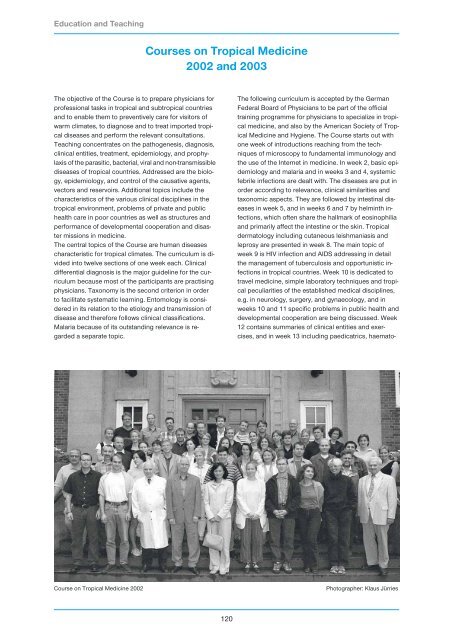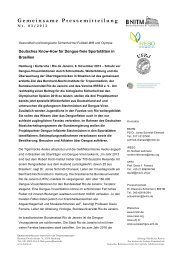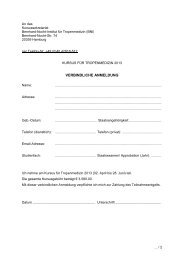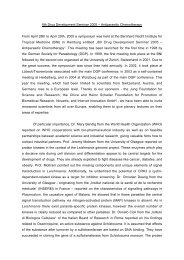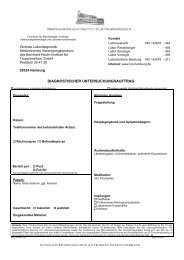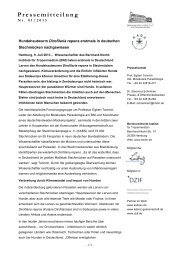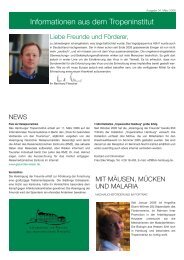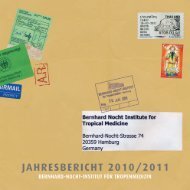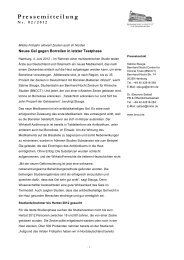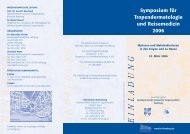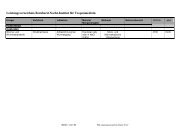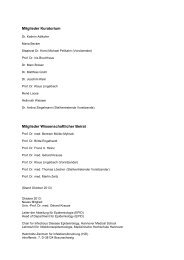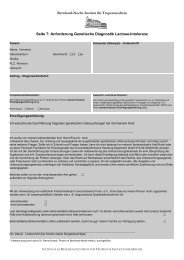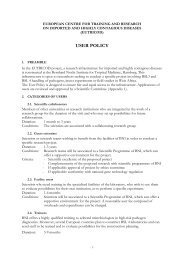Research Group Heussler (Malaria I) - Bernhard-Nocht-Institut für ...
Research Group Heussler (Malaria I) - Bernhard-Nocht-Institut für ...
Research Group Heussler (Malaria I) - Bernhard-Nocht-Institut für ...
Create successful ePaper yourself
Turn your PDF publications into a flip-book with our unique Google optimized e-Paper software.
Education and Teaching<br />
The objective of the Course is to prepare physicians for<br />
professional tasks in tropical and subtropical countries<br />
and to enable them to preventively care for visitors of<br />
warm climates, to diagnose and to treat imported tropical<br />
diseases and perform the relevant consultations.<br />
Teaching concentrates on the pathogenesis, diagnosis,<br />
clinical entities, treatment, epidemiology, and prophylaxis<br />
of the parasitic, bacterial, viral and non-transmissible<br />
diseases of tropical countries. Addressed are the biology,<br />
epidemiology, and control of the causative agents,<br />
vectors and reservoirs. Additional topics include the<br />
characteristics of the various clinical disciplines in the<br />
tropical environment, problems of private and public<br />
health care in poor countries as well as structures and<br />
performance of developmental cooperation and disaster<br />
missions in medicine.<br />
The central topics of the Course are human diseases<br />
characteristic for tropical climates. The curriculum is divided<br />
into twelve sections of one week each. Clinical<br />
differential diagnosis is the major guideline for the curriculum<br />
because most of the participants are practising<br />
physicians. Taxonomy is the second criterion in order<br />
to facilitate systematic learning. Entomology is considered<br />
in its relation to the etiology and transmission of<br />
disease and therefore follows clinical classifications.<br />
<strong>Malaria</strong> because of its outstanding relevance is regarded<br />
a separate topic.<br />
Courses on Tropical Medicine<br />
2002 and 2003<br />
Course on Tropical Medicine 2002 Photographer: Klaus Jürries<br />
120<br />
The following curriculum is accepted by the German<br />
Federal Board of Physicians to be part of the official<br />
training programme for physicians to specialize in tropical<br />
medicine, and also by the American Society of Tropical<br />
Medicine and Hygiene. The Course starts out with<br />
one week of introductions reaching from the techniques<br />
of microscopy to fundamental immunology and<br />
the use of the Internet in medicine. In week 2, basic epidemiology<br />
and malaria and in weeks 3 and 4, systemic<br />
febrile infections are dealt with. The diseases are put in<br />
order according to relevance, clinical similarities and<br />
taxonomic aspects. They are followed by intestinal diseases<br />
in week 5, and in weeks 6 and 7 by helminth infections,<br />
which often share the hallmark of eosinophilia<br />
and primarily affect the intestine or the skin. Tropical<br />
dermatology including cutaneous leishmaniasis and<br />
leprosy are presented in week 8. The main topic of<br />
week 9 is HIV infection and AIDS addressing in detail<br />
the management of tuberculosis and opportunistic infections<br />
in tropical countries. Week 10 is dedicated to<br />
travel medicine, simple laboratory techniques and tropical<br />
peculiarities of the established medical disciplines,<br />
e.g. in neurology, surgery, and gynaecology, and in<br />
weeks 10 and 11 specific problems in public health and<br />
developmental cooperation are being discussed. Week<br />
12 contains summaries of clinical entities and exercises,<br />
and in week 13 including paedicatrics, haemato-


